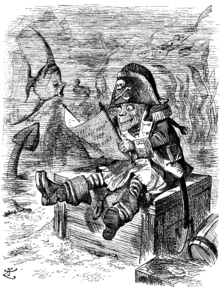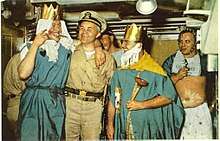Davy Jones' Locker
Davy Jones' Locker is a metaphor for the bottom of the sea: the state of death among drowned sailors and shipwrecks.[2] It is used as a euphemism for drowning or shipwrecks in which the sailors' and ships' remains are consigned to the depths of the ocean (to be sent to Davy Jones' Locker).[3]
| Davy Jones' locker | |
|---|---|
 Davy Jones's Locker, by John Tenniel, 1892 | |
| Genre | Nautical folklore |
| Information | |
| Type | Euphemism for sea floor, or resting place for sailors drowned at sea. |

The origins of the name of Davy Jones, the sailors' devil,[2] are unclear, with a 19th-century dictionary tracing Davy Jones to a "ghost of Jonah".[4] Other explanations of this nautical superstition have been put forth, including an incompetent sailor or a pub owner who kidnapped sailors.[5]
History
The earliest known reference of the negative connotation of Davy Jones occurs in the Four Years Voyages of Capt. George Roberts, by the author Daniel Defoe, published in 1726 in London.
Some of Loe's Company said, They would look out some things, and give me along with me when I was going away; but Ruffel told them, they should not, for he would toss them all into Davy Jones's Locker if they did.
— Daniel Defoe[6]
An early description of Davy Jones occurs in Tobias Smollett's The Adventures of Peregrine Pickle, published in 1751:[4]
This same Davy Jones, according to sailors, is the fiend that presides over all the evil spirits of the deep, and is often seen in various shapes, perching among the rigging on the eve of hurricanes:, ship-wrecks, and other disasters to which sea-faring life is exposed, warning the devoted wretch of death and woe.
— Tobias Smollett[4]
In the story, Jones is described as having saucer eyes, three rows of teeth, horns, a tail, and blue smoke coming from his nostrils.
Proposed origins of the tale
The origin of the tale of Davy Jones is unclear, and many conjectural[2] or folkloric[7] explanations have been told:
- 'The Dictionary of the Vulgar Tongue' by Francis Gros, published in 1811, includes the definitions: "DAVID JONES. The devil, the spirit of the sea: called Necken in the north countries, such as Norway, Denmark, and Sweden" and "DAVID JONES' LOCKER. The sea".[8]
- The 1898 Dictionary of Phrase and Fable connects Davy to the West Indian duppy (duffy) and Jones to biblical Jonah:
"He’s gone to Davy Jones' locker, i.e. he is dead. Jones is a corruption of Jonah, the prophet, who was thrown into the sea. Locker, in seaman’s phrase, means any receptacle for private stores; and duffy is a ghost or spirit among the West Indian negroes. So the whole phrase is, "He is gone to the place of safe keeping, where duffy Jonah was sent to."
— E. Cobham Brewer[4] - David Jones, a real pirate, although not a very well-known one, living on the Indian Ocean in the 1630s.[9]
- Duffer Jones, a notoriously myopic sailor who often found himself overboard.[10]
- A British pub owner who supposedly threw drunken sailors into his ale locker and then gave them to be drafted on any ship.[7]
- Linguists consider it most plausible that Davy was inspired by Saint David of Wales, whose name was often invoked by Welsh sailors, and Jones by the Biblical Jonah.[11]
Reputation

Not all traditions dealing with Davy Jones are fearful. In traditions associated with sailors crossing the Equatorial line, there was a "raucous and rowdy" initiation presided over by those who had crossed the line before, known as shellbacks, or Sons of Neptune. The eldest shellback was called King Neptune, and Davy Jones would be re-enacted as his first assistant.[12]
Use in media
20th century

The 1959 Broadway musical Davy Jones' Locker with Bil Baird's marionettes had a two-week run at the Morosco Theatre.[13]
In the 1960s television series The Monkees episode "Hitting The High Seas", the character Davy Jones (played by musician Davy Jones) receives special treatment while kidnapped in a ship as he claims to be related to "The Original" Davy Jones, his grandfather. Meanwhile, his fellow band members are held hostage, leading to various humorous situations. The fact that Jones the musician shared a name with the legendary seafarer has itself led to a number of puns swapping the two in the decades that followed.
In the cartoon "The Haunted Ship", from the Aesop's Fables series produced by the Van Beuren animation studios, Davy Jones is depicted as a living skeleton wearing a pirate's bicorne.
21st century
The concept of Davy Jones was conflated with the legend of the Flying Dutchman in the Pirates of the Caribbean film series, in which Davy Jones's locker is portrayed as a purgatory place of punishment for those who crossed Davy Jones. Jones is portrayed as a captain assigned to ferry those drowned at sea to the afterlife before he corrupted his purpose out of anger at his betrayal by his lover, the sea-goddess Calypso. Davy Jones is portrayed in the movie as an enigma of the sea, featuring octopus arms for a beard and crab claw for a hand.
The origins of Davy Jones and Calypso are revealed in the stand-alone novella "Davy Jones & the Heart of Darkness". The Scottish origins are consistent with the legend, but this novella includes Davy's training aboard Inferno with Charon, the ferryman of Hades. The tale is written by Dave Montalbano and illustrated by Rachel Galvin.[14]
The term has also been used repeatedly in the animated TV series SpongeBob SquarePants to represent an actual locker in the bottom of the sea where Davy Jones (of The Monkees fame) keeps his gym socks.[15]
French singer Nolwenn Leroy recorded a song titled "Davy Jones" for her 2012 album Ô Filles de l'Eau. The English version contains the lines: "Davy Jones, oh Davy Jones / Where they gonna rest your bones / Down in the deep blue sea / Down in the deep blue sea..."
American surf-rock/punk band Rusty Shipp released a song in late 2012 titled "Davy Jones Ain't Got Nothin' On Me", which makes several references to Davy Jones's Locker, and also is believed to make reference to the "Flying Dutchman" myth. This is especially prevalent in the lines: "all of the sudden, a ghost ship appears/with a crew of souls whose singing I hear".
See also
Notes
- Caption: Oh learn a lesson from Joe Gotch - Without a lifebelt he stood watch - "Abandon ship" came over the phones - He now resides with Davy Jones
References
- However, presented here character is a fake, created by Pipes, Perry and Pickle to scare Mr. Trunnion; see: Smollett, Tobias (1751). The Adventures of Peregrine Pickle. London: D. Wilson. p. 66.
- Farmer, John S; Henley, William Ernest (1927). A Dictionary of slang and Colloquial English. pp. 128–129.
- Farmer, John Stephen; Henley, W. E. (1891). Slang and its analogues past and present: A dictionary ... with synonyms in English, French ... etc. Harrison & Sons. p. 258. Retrieved 16 January 2013.
- Brewer, E. Cobham (1 January 1898). "Davy Jones's Locker". Dictionary of Phrase and Fable. Retrieved 30 April 2006.
- Daniel (29 September 2018). "The Legend of Davy Jones' Locker". Maritime Manual. Retrieved 11 August 2020.
- Defoe, Daniel (1726). The four years voyages of capt. George Roberts. Written by himself. p. 89.
- Michael Quinion (1999). "World Wide Words". Retrieved 15 January 2013.
- "The Dictionary of the Vulgar Tongue".
- Rogoziński, Jan (1 January 1997). The Wordsworth Dictionary of Pirates. Hertfordshire. ISBN 1-85326-384-2.
- Shay, Frank. A Sailor's Treasury. Norton. ASIN B0007DNHZ0.
- "August 22, 2014 Word of the Day: Davy Jones' Locker". Retrieved 23 August 2014.
- Connell, Royal W; Mack, William P (1 August 2004). Naval Ceremonies, Customs, and Traditions. pp. 76–79. ISBN 9781557503305.
- "Davy Jones' Locker @ Morosco Theatre". Retrieved 25 September 2016.
- Montalbano, Dave/ Galvin, Rachel (Illustrator) 2013, ©2013 English Book : Mixed form viii, 140 pages : illustrations ; 23 cm ISBN 9780989513401 (paperback) 0989513408 (paperback)
- "Davy Jones' Locker". SpongePedia. Retrieved 5 August 2018.
